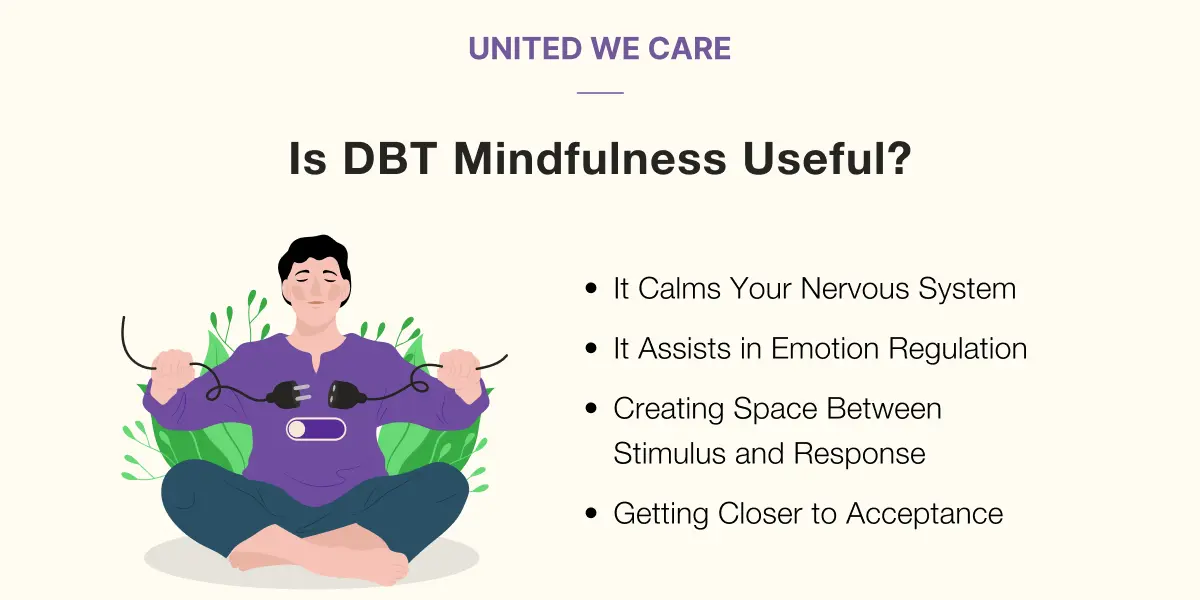Introduction
Mindfulness is one of the four core skills taught in DBT. The term ‘mindfulness’ is so popular now that it’s almost a buzzword. Here, we are referring to it in a clinical sense, as it is a key element of dialectical behavioral therapy.
This article will discuss in detail why mindfulness is important, how it helps with DBT, and why it’s useful.
What is DBT Mindfulness
Mindfulness is the practice of being fully present in the moment and deepening our awareness. In DBT, this is done with the intention of living more deliberately and choosing how we respond to situations.
DBT Mindfulness is heavily researched as a part of skills training as well as a stand-alone module [1]. The results have been promising and show a positive impact on individuals’ overall well-being.
Mindfulness is a crucial skill for one to adjust to change, especially in the context of DBT. As a therapy, it is designed to help people change their unhealthy patterns of behavior. As the individual learns to be more present and deepen their awareness, they also learn how to choose their reactions.
How is Mindfulness a DBT Skill?
In this section, we will describe some of the benefits of mindfulness that make it a useful skill in DBT. Bear in mind that these are only a few of the many ways mindfulness is a DBT skill [2].
Awareness
One of the main reasons why people practice mindfulness is to become more aware of what’s happening. Observing a moment and everything happening or present in that moment can be incredibly powerful.
It allows you to take a pause from the role of reacting and take up the role of the observer. As a result, you’re able to gauge more information and then reflect on the best move to take next.
Internal & External
DBT mindfulness isn’t just about noticing things that are happening around you. In fact, this level of awareness also includes looking within. This could mean noticing your physiology, your emotions, your thoughts, or your whole self.
Consequently, one is able to factor in information from both internal and external sources when trying to process a situation. Automatically, this leads to better balance and well-being.
Relaxation
As mentioned above, mindfulness focuses on the internal stimuli being received. For example, how is one breathing, what is their posture like, and whether they have tense muscles.
As a part of DBT, you learn to relax your body and make your breath more regular. This further leads to better access to cognitive functions like problem-solving, decision-making, and empathy. Each of these is useful in the DBT process.
Wise Mind
Wise Mind is a DBT concept that teaches you to make decisions that balance your rational and emotional mind. Understandably, mindfulness is a prerequisite for you to practice Wise Mind.
It simultaneously validates your emotions and shows you how to act on them in rational and healthy ways.
Is DBT Mindfulness Useful?
If you still need convincing, this section will explain how DBT mindfulness is useful. Again, these are only some of the several ways this DBT skill plays a role in nurturing and sustaining well-being.

It Calms Your Nervous System
DBT Mindfulness requires a person to observe carefully both the internal and external sources of stimuli. Naturally, this requires one to take a pause or at least take a metaphorical step back and observe.
By doing so, one is in a better position to calm down their nervous system [3]. The relaxation and deeper breaths also assist in this process.
It Assists in Emotion Regulation
Furthermore, being mindful gives a person the room to process their emotions in a healthy way. You are able to detect the feeling building up, what triggered it, or whether there is residual emotion from something similar in the past.
Clearly, you get a much better picture of what’s happening to you when you’re mindful. This is greatly useful in emotion regulation.
Creating Space Between Stimulus and Response
One of the best things about DBT mindfulness is that it shows you how to create space between a situation and your reaction to it. This space could be temporal, physical, or even emotional.
The act of observing involved in mindfulness gives you a certain level of distance. It is within this space that you learn to choose your own response.
Getting Closer to Acceptance
Lastly, DBT mindfulness is centered around the process of acceptance and makes it easier to practice. Life will always have its ups and downs. On most occasions, there will be things that you cannot control or change.
Through DBT mindfulness, one learns how to be open to accepting such things. Therefore, it becomes possible to let things go gradually.
Conclusion
Mindfulness is a critical component in dialectical behavioral therapy, also known as DBT. This treatment approach is designed for people dealing with intense emotions, which is a part of several psychological disorders.
Even if you don’t have a diagnosed mental health condition, DBT mindfulness can help you become better at regulating your emotions and living life deliberately. To learn more about DBT mindfulness, contact our experts at United We Care.
References
[1] Eeles, J., & Walker, D. M. (2022). Mindfulness as taught in Dialectical Behaviour Therapy: A scoping review. Clinical psychology & psychotherapy, 29(6), 1843–1853. https://doi.org/10.1002/cpp.2764
[2] “Mindfulness : Dialectical Behavior Therapy,” Dialectical Behavior Therapy, Dec. 07, 2023. https://dialecticalbehaviortherapy.com/mindfulness/
[3] Yeh, Z.T. and Lin, C.L., 2022. Mindfulness-Based Stress Reduction Intervention and Emotional Recovery in Borderline Personality Features: Evidence from Psychophysiological Assessment. Mindfulness, 13(4), pp.881-896.









